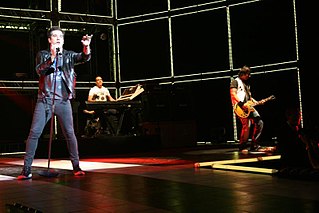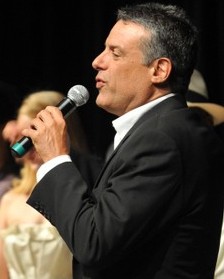
Pedro Machado Abrunhosa is a Portuguese singer, musician and songwriter. Aside from his music, he is known for always wearing sunglasses in public. Abrunhosa also played himself in the 1999 film La Lettre. He is an active spokesman for the Associação Fonográfica Portuguesa regarding Copyright infringement on the Internet.

Legião Urbana was a Brazilian rock band formed in 1982 in Brasília, Distrito Federal. The band primarily consisted of Renato Russo, Dado Villa-Lobos (guitar) and Marcelo Bonfá (drums). In its earlier days, Legião Urbana also had a full-time bassist, Renato Rocha, but he left the band due to creative divergences.

Jota Quest is a Brazilian pop rock band. The band was founded in 1993, in Belo Horizonte, Minas Gerais as J. Quest, but due to trademark issues with Hanna-Barbera, they renamed themselves Jota Quest. The band members include: Rogério Flausino (vocals), Marco Túlio (guitar), Márcio Buzelin (keyboards), "PJ" – Paulo Roberto Diniz, Jr. (bass) and Paulinho Fonseca (drums). Jota Quest initially stood apart from Minas Gerais' musical tradition by garnering national success with pop rock and blue eyed soul-tinged pop. Eventually the band exposed its Clube da Esquina influences, including collaborations with Minas Gerais exponents Paulinho Pedra Azul and Milton Nascimento in Oxigenio as well as jams with 14 Bis and a collaboration with Roberto Carlos over his hit single "Alem do Horizonte". Jota Quest sold over 4,000,000 copies in Brazil, Latin America and Portugal.

Titãs are a Brazilian rock band from São Paulo. Though they basically play pop/alternative rock, their music has touched a number of other styles throughout their 30-year career, such as new wave, punk rock, grunge, MPB and electronic music.

Os Paralamas do Sucesso is a Brazilian rock band, formed in Seropédica, Rio de Janeiro, in the late 1970s. Its members since 1982 are Herbert Vianna, Bi Ribeiro (bass), and João Barone (drums). In its beginning, the band combined reggae and ska with rock, but later added horn arrangements and Latin rhythms.

Titanomaquia(Titanomachia) is the seventh album released by Brazilian rock band Titãs, released in 10 July 1993. All songs are credited to the band as a whole, as it happened in the previous album, Tudo Ao Mesmo Tempo Agora. Also, it marks the first time Jack Endino worked with them, the only foreign one they ever worked with.

Nando Reis is a Brazilian musician and producer, best known as the former bassist and one of the lead singers of Brazilian rock band Titãs and for his successful solo career, with his own band called Os Infernais. He has also produced a few albums, including some related to Cássia Eller, who has made several significant partnerships with him, and Marisa Monte. In 2012, Nando Reis was listed among the top ten Brazilian artists at the ECAD list of artists who earned the most from copyright in the first semester of that year. In 2016, he was at the 15th position, besides being 6th in the ranking of earnings from live performances and topped the ranking of earnings from music played in public places.

Fábio Villela Barreto Borges was a Brazilian filmmaker, actor, screenwriter, and film producer. He was best known for directing O Quatrilho and Lula, o filho do Brasil, a biography based on President Luiz Inácio Lula da Silva's early life, which had been the most expensive film in the history of Brazilian cinema upon its release. Barreto slipped into a coma in 2009 after being involved in a car accident in Rio de Janeiro and, in August 2014, was reported to be in a minimally conscious state. He died on November 20, 2019, after almost 10 years in a coma.

Zé Ramalho is the debut album by the artist of same name, released in 1978.

Nheengatu is the fourteenth studio album by Brazilian rock band Titãs, released on May 12, 2014. It is their first studio album with session drummer Mario Fabre, who replaced Charles Gavin, their last with vocalist and guitarist Paulo Miklos, who left the then quartet in 2016, and also their first release through Som Livre and producer Rafael Ramos. The album was dedicated to Rachel Salém, Miklos' wife who died on July 23, 2013 of lung cancer.

Nivaldo Batista Lima, known by his stage name Gusttavo Lima, is a Brazilian singer, songwriter and record producer. He is known in Brazil for his many hit songs, and gained international prominence through the song "Balada".

Far from Alaska is a Brazilian rock band formed in 2012 in Natal, Rio Grande do Norte, and based in São Paulo, São Paulo.
"Dino vs. Dino" is the debut single by Brazilian stoner rock band Far from Alaska, and the third track of their debut album modeHuman. The song received a promotional video, shot at the Dunas do Rosado Environmental Protection Area in Porto do Mangue, a municipality in the state of Rio Grande do Norte, where the group comes from. It was released on 8 October 2013, with an exclusive premiere at Tenho Mais Discos que Amigos! website.
Gustavo Bonatto Barreto, simply known as Barreto, is a Brazilian footballer who plays for Ponte Preta on loan from Criciúma as a defensive midfielder.

Unlikely is the second album by Brazilian stoner rock band Far from Alaska, released on 4 August 2017. It was recorded in the United States, produced by Sylvia Massy and financed via a crowdfunding campaign. It is their last album with bassist Edu Filgueira, who left the band in January 2018.

Ego Kill Talent are a Brazilian rock band from São Paulo, Brazil. The band was founded in 2014 by Jean Dolabella and Theo van der Loo. The name of the band is a shortened version of the saying "Too much ego will kill your talent". The band is known for changing musical instruments during a performance.

Doze Flores Amarelas is the fifteenth studio album by Brazilian rock band Titãs, released in parts from 27 April to 11 May 2018. It is the band's first album via Universal Music, the first without vocalist, guitarist and founding member Paulo Miklos and the first with his session replacement Beto Lee, son of Brazilian rock singer Rita Lee, who guest performs on the album with narrations.

Forfun was a Brazilian alternative rock band which reached the peak of its popularity in the mid- to late 2000s. Formed in Rio de Janeiro in 2001, their initial line-up comprised vocalist/guitarist Danilo Cutrim, bassist Vítor Isensee and drummer Bruno Tizé. By 2002, Tizé left the band and was replaced by Nicholas Christ, while Isensee switched his position with Rodrigo Costa to become second guitarist. Their first shows were frequently attended by the sons of then-Deputy Jair Bolsonaro, Eduardo and Carlos, who were personal friends of the bandmembers; Eduardo would later cameo in the music video for "História de Verão". They released in 2003 the demo album Das Pistas de Skate às Pistas de Dança, which was a significative underground hit, and in 2005 their official debut, Teoria Dinâmica Gastativa, produced by Liminha, came out through Universal Music Group.

Thalía is a compilation album by Mexican singer Thalía, and fourth eponymous album released on 9 December 2013, by Sony Music. The album was released exclusively in Brazil. The album is a collection that contains her greatest hits since joining Sony Music, as well as four songs sung by Thalía exclusively in Portuguese. The album's lead single "Estou Apaixonado" had radio airplay success entering the charts in Brazil and featured Brazilian singer Daniel.
Bratislava is a Brazilian rock band formed in São Paulo in 2010. The current line-up consists of Victor Meira, Jonas Andrade (guitar), José Roberto Orlando (bass) and Lucas Felipe Franco (drums). Their second album, Um Pouco Mais de Silêncio, released in a fanzine format, was featured in various 2015 "best of" lists by specialized sites. Newspaper O Estado de S. Paulo considered the band one of the musical bets for 2016.

















